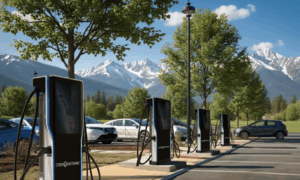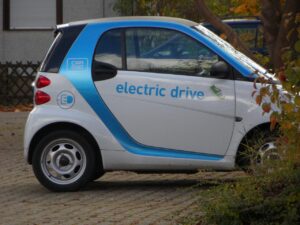
Home / EV Charging News / How High Temperatures Impact Your EV Battery Performance
As electric vehicles (EVs) become more common on our roads, many drivers are learning that owning an EV isn’t just about charging and driving—it’s also about protecting your battery. Heat is one of the most overlooked factors that can compromise EV battery health.
Elevated temperatures can greatly affect an electric vehicle’s battery efficiency, longevity, and overall performance. In this article, Nick Zamanov, EV infrastructure expert at CyberSwitching, explains how heat affects EV batteries and what you can do to reduce the damage.
Lithium-ion batteries, like those used in most EVs, are sensitive to temperature. While cold can reduce performance temporarily, excessive heat causes permanent degradation. Prolonged exposure to high temperatures—especially above 85°F (29°C)—accelerates the breakdown of battery chemistry and internal components.
This can result in:
Monitoring EV battery temperature is critical to prevent overheating and protect your battery from long-term damage. In hot climates, EV batteries may lose usable capacity faster than in milder areas—making thermal protection essential for long-term performance.
Most EVs are equipped with thermal management systems to keep the battery within an optimal temperature range. However, in extreme heat, these systems must work overtime—consuming additional energy and reducing your driving range.
Advanced EVs use liquid cooling systems that help maintain a safe temperature, but even these have limits. When heat becomes excessive, the vehicle may automatically limit charging speed or reduce power output to protect the battery.
Effective EV battery thermal management can help minimize the impact of high temperatures, keeping your vehicle efficient and safe on the road.
Charging your EV when it’s already hot can be risky, especially if you’re using a fast charger. Fast charging generates extra heat, and when the battery is already warm, it can lead to thermal stress and chemical instability.
To prevent this from happening:
Heat impact on EVs battery is especially evident during high-speed charging, where elevated temperatures can compound internal stress and accelerate wear.
Many EV drivers notice a drop in range during the summer—not because of the battery itself, but because of additional energy use. Air conditioning, thermal systems, and higher tire pressure from heat all contribute to reduced efficiency.
Even a small range loss—5% to 10%—can be significant on longer trips. To minimize this:
Improving battery efficiency in summer starts with good driving habits and smart charging routines.
Maintaining your EV battery in hot conditions doesn’t have to be complicated. With a few smart habits, you can extend its life and improve performance:
Electric car battery performance in hot weather can be preserved with proactive steps and the right tools—protecting both your investment and your daily driving needs.
“Heat is one of the most silent threats to EV battery health,” says Nick Zamanov, EV infrastructure expert at CyberSwitching. “The good news is, with a little knowledge and the right tools, drivers can minimize the damage and keep their vehicles running efficiently for years.”
Smart charging and temperature-aware practices are more than just conveniences—they’re essential to protecting your investment and maximizing battery life.
If you want to keep your EV battery safe from heat damage, consider installing a smart home EV charger that helps you monitor and manage your charging intelligently. Contact CyberSwitching to learn more about their smart charging solutions designed for real-world conditions.
A: While most EVs use lithium-ion batteries, the impact of heat may vary slightly depending on the manufacturer’s battery chemistry and thermal management system.
A: Yes. Charging while the car is exposed to direct sunlight can increase battery temperature and cause additional stress. Charging in shaded or cool areas is recommended.
A: If your EV has smart charging features, it’s generally safe. However, avoid leaving it fully charged at 100% in hot weather for long periods.
A: Charging during off-peak hours (such as at night or early morning) helps reduce battery stress and can also lower your electricity costs.
A: Yes. Smart chargers let you schedule charging, track temperature, and avoid charging during peak heat hours—helping protect battery health over time.



